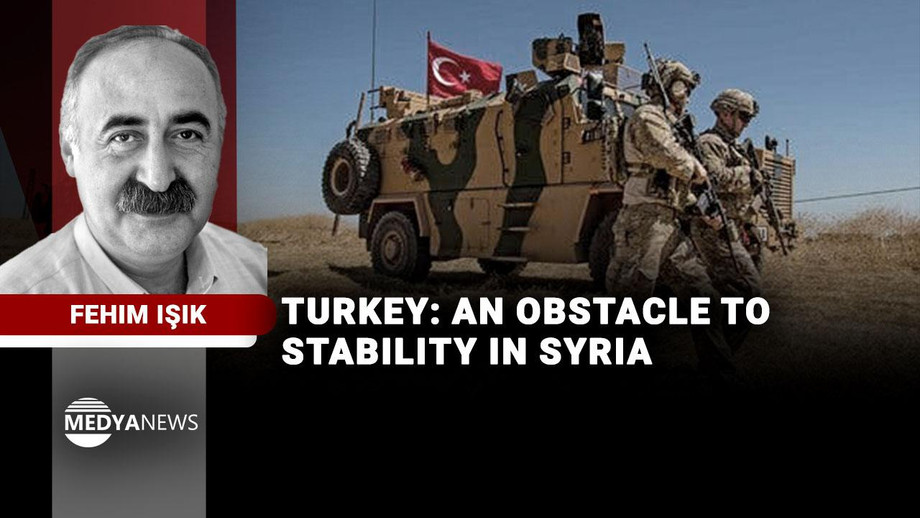Turkey’s policies in Syria hinder stability, writes veteran journalist Fehim Işık, targeting Kurdish gains in the region and perpetuating chaos, as global powers remain silent.
By Fehim Işık
On 8 December, with the fall of the Assad regime in Syria, a new and perhaps even more complex phase has begun. Expecting peace to emerge swiftly from this scenario would be a serious misjudgement. The primary reason for this complexity is the fragmented nature of all parties involved, except for the Kurds.
While Hay’at Tahrir al-Sham (HTS), formerly the al-Nusra Front with roots in al-Qaeda, appears to be the dominant force in the field, the reality will soon prove otherwise. Yes, under HTS leadership, steps will be taken to form a provisional government to govern Syria, and this is beyond doubt. However, this government will neither represent the Syrian people nor cater to the diverse ethnicities and religious groups seeking to live in a free country.
These fragmented groups, acting as proxies for various states, will definitely work together only to ensure that stability does not return to Syria or the wider region. For these actors, chaos serves their interests, allowing them to manipulate Syria to their advantage. A major objective for the influential powers behind these proxy groups was to neutralise Russia and Iran which was a goal they have largely achieved.
Kurds as a Cohesive Force in Post-Assad Syria
Following the events of 8 December, the Kurds have emerged as the most organised and cohesive force in Syria. Since declaring de facto autonomy in the Rojava region in 2012, the Kurds have been targeted by Turkey, particularly since July 2015. After HTS-led forces advanced towards Aleppo on 27 November and following the fall of the Assad regime, Turkey has remained active in the region.
Turkey initially directed its Syrian National Army (SNA), composed of radical jihadist groups under its influence, towards Til Rifat where displaced Kurdish refugees had settled during Turkey’s occupation of Afrin in 2018. Even before the fall of the Assad regime, these refugees were once again forced to flee their lands. Post-regime, Turkey and its allied jihadist groups launched attacks on Manbij, using air and ground forces with reports suggesting participation by at least 60,000 jihadists. These assaults led to the occupation of Manbij.
Turkey’s aggression continues unabated, targeting key infrastructure like the Qaraqozak Bridge, which connects the banks of the Euphrates, and the Tishrin Dam, essential for water and energy in the region. Kobane remains the primary target, with Turkey also eyeing control over Arab-majority cities like Raqqa, Tabqa, Hasekê, and Deir ez-Zor within the Autonomous Administration of North and East Syria (AANES).
International Silence and Turkey’s Role in Prolonging Instability
While isolated protests against these attacks have arisen globally, no major power, including the US, has taken effective steps to curb Turkey’s actions, many of which qualify as crimes against humanity. US statements occasionally express concern, but they often align with Turkey’s narratives, supporting its so-called fight against terrorism.
According to statements by the Syrian Democratic Forces (SDF) Commander General Mazloum Abdi, the US has requested the withdrawal of Kurdish forces from areas targeted by Turkey. However, it remains unclear what concessions were made in exchange for this withdrawal or whether Turkey will cease its attacks. Despite a ceasefire announcement, attacks by Turkey-backed jihadist groups and Turkish warplanes have persisted. Most concerningly, civilians, including the wounded in hospitals, continue to fall victim to these assaults, constituting war crimes with no resolution in sight.
Turkey’s Opposition to Kurdish Representation in Syria’s Future
Turkey’s attacks aim to undermine the most cohesive and organised force in Syria, preventing the Kurds from playing a role in the country’s future. This attacks have been intensified despite statements from Kurdish political actors and the AANES affirming their commitment to building a democratic and free Syria, and being ready for any resolution and peace process
Even HTS leader al-Jolani, initially expressing liberal messages and signalling change, issued similar commitments. However, states like Turkey and others in the region oppose the inclusion of Rojava’s Autonomous Administration in a new Syria. Instead, they promote the Kurdish National Council (ENKS), a group aligned with Turkish interests and lacking genuine representation, and remained within the Syrian Interim Government found by Turkey.
Instrumentalising ‘the PKK’ as an Excuse of Attacking the Kurds
Justifying their actions by invoking the PKK, Turkey and its proxies aim to impose collective punishment on the Kurds of Rojava and the broader Syrian population. Yet, they ignore that PKK-affiliated forces played a decisive role in defeating ISIS across the region, from Shengal (Şengal) to Erbil (Hewlêr), from Raqqa to Kobanê, paying a heavy price for these victories. After completing their mission, these forces including the Kurdish ones withdrew to their areas, as they had pledged.
Nonetheless, this narrative of ‘PKK terrorism’ continues to fuel Turkey’s strategy, turning Rojava into a theatre of oppression and punishing all Syrians who resist.
A Path to Greater Chaos
This perilous and insidious approach, led by Turkey and its jihadist allies, has failed to bring stability to the region and promises only greater chaos. Without addressing this reality, progress in Syria remains an illusion.
Fehim Işık is a specialist journalist, academic and a member of the Kurdish Culture and Research Foundation (KÜRT-KAV). A founding member of the pro-Kurdish Democracy and Peace Party (DBP) established in 1996, Işık was at the party’s central executive committee until Turkish Constitutional Court closed the party in 2002.


